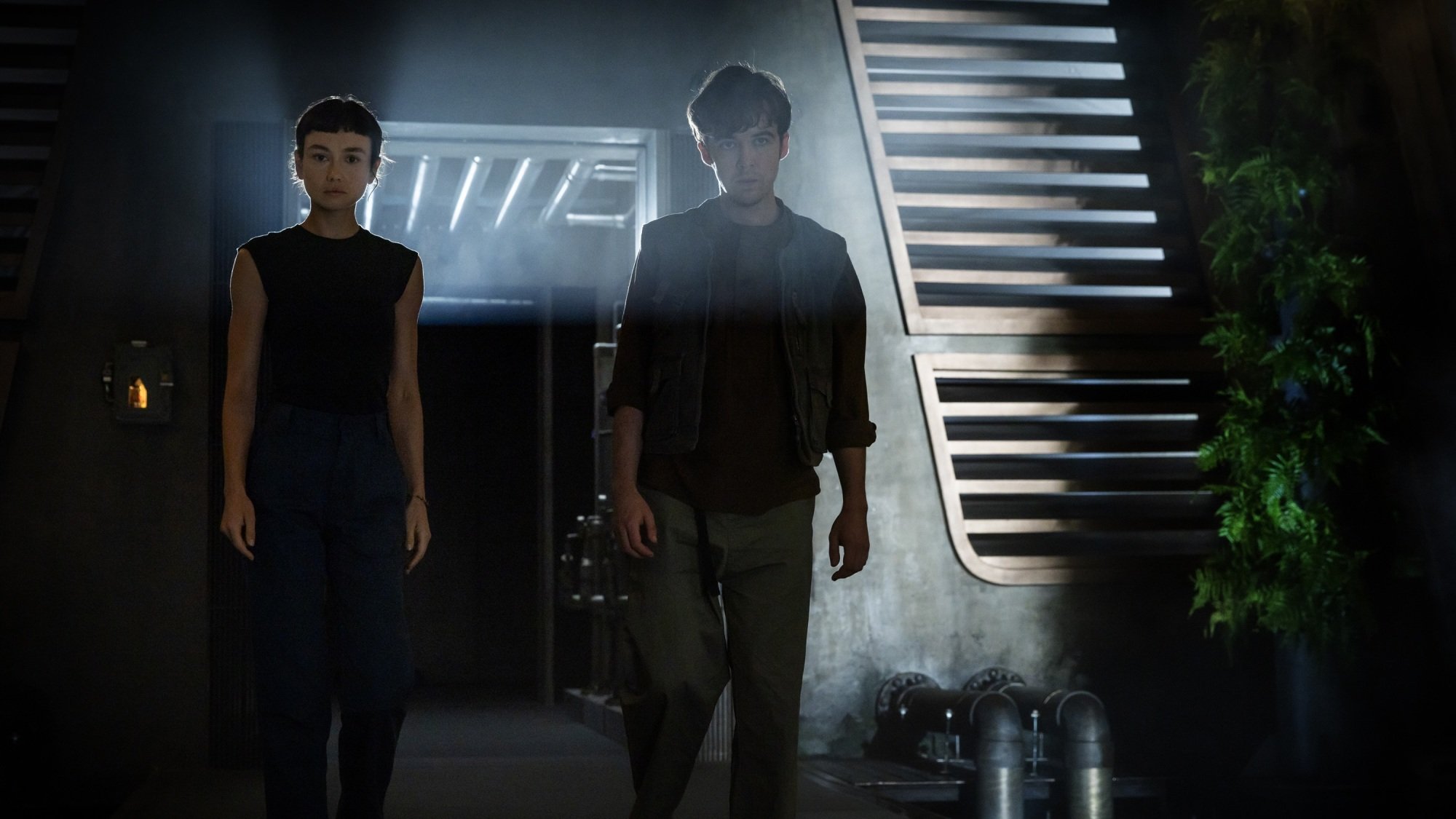Tech
Five years of remote work? Try 25 years.

For a comic strip starring stick figures, Randall Monroe's xkcd has long been unusually relatable. Never more so than five years ago this month, when the strip offered its iconic response to COVID lockdowns around the world.
"Experts are saying people may need to self-isolate to combat the virus," says a TV reporter in the first panel. A stick figure viewer takes a beat, then announces: "I've been practicing for this moment my whole life."
Introverted homebodies everywhere could relate. But I could relate for another reason. As the pandemic broke out, I had been living the brave new world of working from home for exactly 20 years.
"I have watched, shocked, as the world has basically mandated that my life apply to everyone," I wrote in my diary at the end of March 2020.
The times were dire — but for an introverted work-from-home journalist, life actually became easier. Almost every source, for almost every story, was stuck at home too, eager to talk. I didn’t have to drive to a single interview, suggest a lunch spot, pick a bar. Companies had to send their products for review without the interminable in-person demo. The publishing industry suddenly discovered it could instantly send PDFs of upcoming books rather than making reviewers wait for hard copies — the bulk of my once-bulging mailbox.
And there was no longer any FOMO about the endless parade of evening events available to someone who's supposed to keep up with the exhausting luminaries of Silicon Valley. I expressed my feelings with a line from an episode of Doctor Who: "Did you wish really hard?" Amy Pond (Karen Gillan) asks the Doctor in "The Doctor's Wife," after his beloved TARDIS takes human form.
I must have wished too hard, I concluded. And then a much older line, from Aesop, also popped into my head: be careful what you wish for. “Now I’m like a cat," I wrote. "Told that I can’t go out, I scratch at the door that held little interest before.”
Working from home, the first 20 years
As the new San Francisco bureau chief for TIME magazine in March 2000 — arriving just in time to witness the dotcom crash — I'd been given a choice. My job was mistitled; the bureau was basically me, and I could work from anywhere in the city. We'll rent you an office downtown, New York HQ said, or you can work from home and we'll put what we would have spent towards your (even then) sky-high San Francisco rent.
Well, I replied, "let me think about that for five seconds." It was a no-brainer, especially for a night owl who hates commuting. I found an architect's home with a view of the Golden Gate Bridge I never would have been able to afford on my own. It was workplace heaven.
And I spent the first few months dealing with a feeling I hadn't expected: crushing guilt at my own good fortune. In the year 2000, according to that year's census, a mere 3.2 percent of people in the U.S. worked from home most of the week. Office dronery was all around me. Driving to Silicon Valley a few times a week, I shuddered at the nightmare of Highway 101.
What about all the other night owls, commute haters, homebodies, or introverts stuck on that clogged freeway at rush hour in both directions? Didn't they deserve what I had? (Perhaps that's when I started wishing really hard.)
There were other challenges to overcome, as months of WFH (we didn't have that acronym yet) turned into years. How not to fall into the dispiriting trap of wearing pajamas all day? Get review products delivered throughout the day, so you always need to be dressed for the UPS guy. How not to overheat your thighs when working with old-school laptops on a couch? Cushions are your friends.
And then there was the question of how not to feel lonely, which I'd sometimes do when I looked up from a raucous conversation in Campfire (a predecessor of Slack) to find that I was not in fact in an office full of jokers. My favorite solution was an IRL one: find artists who wanted to co-work. Obsessed with creating their latest thing, unlikely to want to chat about tech or news, Bay Area artists were great for getting into a state of flow; they also often came with a hard drive of MP3s I could add to my stash.
And then there was the never-ending challenge of how to draw a bright line between work life and home life when they happened in the same place. In part, this was a problem of my position. Any major news event could upend my week at any time; if a major earthquake struck, I had to be ready to hire a helicopter to survey the damage.
Some editors in New York didn't understand time zones, and would call the bureau phone by my bed when they got into work. I became very good at sounding awake at 6 a.m., and a day when I could have coffee before my first call instantly became a very good day.
Regardless, the fact that WFH was more productive, at least for me, became clear when I spent the occasional week at New York HQ. The aimless watercooler and kitchen conversations seemed to eat as much of my day as the commute I was suddenly taking. My diet was worse, not aided by all the sugary goods that office life often presses upon you (who could say no to birthday cake?).
I walked less overall: no afternoon constitutionals around the neighborhood. And desks with no optional couch? C'mon, how are you supposed to work in a vertical position after that much cake?
Eleven years into my WFH lifestyle, 4.3 percent of Americans were working from home most of the week, up from 3.8 percent a decade earlier. The pace of change was strangely slow; the office lifestyle had America in its grip. Still, I'd moved on to other publications, and acquired a manager who heartily approved of couch working: my cat, Mowgli, who loves to gaze into the screen and supervise the writing process, purring when he likes a paragraph.
This can be so conducive to long productive laptop sessions — more so than coffee, more so than any perk in any office — that cats should probably count as a business expense.
Granted, Mowgli was sometimes less keen on the keyboard part of laptops. Sometimes he would lean his head on it, looking reproachful; other times, more of a helicopter boss, he would use his paw to redirect my hand. When I wrote How Star Wars Conquered the Universe from that couch, Mowgli began trying to push the laptop out of his way with his back.
I gave him a shout-out in the acknowledgements, for being a true Jedi master and helping me find a way to let go of my conscious self and reach out with my feelings.
When the world went WFH
The percentage of WFH workers ticked up over the decades as the internet seeped further into our lives, but never as fast as I expected. Then came the pandemic, the moment I'd been unintentionally preparing for. A quarter of U.S. employees were WFH full time in 2021; by 2023, with the pandemic largely over, that number had ticked up to 28 percent. The trend seemed irreversible (whether it actually is or not is a different story).
I tried not to be a WFH hipster as social media filled up with accounts of people learning all the pitfalls I'd dealt with for decades. They also discovered new ways to deal with them, beyond the saving graces of Slack and Zoom. I'll never forget one stylish friend's solution to the pajamas/sweatpants problem, as described in her Facebook post: "I am promoting all my evening gowns to workwear, effective immediately."
It reminded me of the surrealist artist Rene Magritte, who was very deliberate about putting on a suit (and the meticulous mindset that went with it) to go paint in his home studio between 9 a.m. and 5 p.m.
It was good to be ahead of the game, to know what was most necessary. The more we work from home, the more structure we need: this was clear a month into the pandemic, when I wrote about my new time management system. Paradoxically, the more we work from home, the more loosey-goosey we can be about when we actually do the work.
By 2020 no one in my New York HQ was calling me at 6 a.m. PT anymore, and work became something that could be done on a night owl's schedule; I also wrote about how the pandemic could de-throne the larks.
By that time, the cat-like restlessness with being inside once I was told to be inside, as noted in my diary, was reaching critical levels. And so I began constructing the most epic outing I could imagine: a series of end-of-day hikes that would together comprise the entire Bay Area Ridge Trail, a 250-mile loop through San Francisco and all its surrounding counties.
Because when you've been working at home for decades, regular off-sites become more necessary than ever.
This column/article/etc reflects the opinions of the writer.
Tech
Hurdle hints and answers for September 24, 2025

If you like playing daily word games like Wordle, then Hurdle is a great game to add to your routine.
There are five rounds to the game. The first round sees you trying to guess the word, with correct, misplaced, and incorrect letters shown in each guess. If you guess the correct answer, it'll take you to the next hurdle, providing the answer to the last hurdle as your first guess. This can give you several clues or none, depending on the words. For the final hurdle, every correct answer from previous hurdles is shown, with correct and misplaced letters clearly shown.
An important note is that the number of times a letter is highlighted from previous guesses does necessarily indicate the number of times that letter appears in the final hurdle.
If you find yourself stuck at any step of today's Hurdle, don't worry! We have you covered.
Hurdle Word 1 hint
To creep around.
Hurdle Word 1 answer
SNEAK
Hurdle Word 2 hint
A long-legged bird.
Hurdle Word 2 Answer
STORK
Hurdle Word 3 hint
To throw.
Hurdle Word 3 answer
CHUCK
Hurdle Word 4 hint
More accurate.
Hurdle Word 4 answer
TRUER
Final Hurdle hint
They show when one smiles.
Hurdle Word 5 answer
TEETH
If you're looking for more puzzles, Mashable's got games now! Check out our games hub for Mahjong, Sudoku, free crossword, and more.
Tech
Five burning questions we have for Alien: Earth Season 2

This summer, FX's Alien: Earth latched onto my brain like a Facehugger latches onto a new host.
Now, with the release of the show's Season 1 finale, you'd think that Facehugger would drop off and leave me be. You'd be wrong! Instead, the Season 1 finale leaves viewers with some major questions we'll be puzzling over until the show's potential return.
Here are the five biggest questions we have for Alien: Earth Season 2.
What does a Neverland run by hybrids look like?
Season 1 of Alien: Earth ends with the group of hybrids known as the Lost Boys in total control over the Neverland research facility. They've imprisoned Boy Kavalier (Samuel Blenkin), Kirsh (Timothy Olyphant), Morrow (Babou Ceesay), Dame Sylvia (Essie Davis), and Atom Eins (Adrian Edmondson). Now, with the adults out of the way, Wendy (Sydney Chandler) declares it's time for the hybrids to "rule."
But what will their rule entail? Will they stay on Neverland, or will they try to extend their authority to the rest of the world? Will they remain fast allies, or will they turn against one another and go full Lord of the Flies on their new island kingdom?
How will Weyland-Yutani and Alien: Earth's other corporations react to Boy Kavalier's plight?

Credit: Patrick Brown / FX
By the end of Alien: Earth Season 1, Weyland-Yutani is closing in on Neverland in order to take back the specimens Boy Kavalier stole. But will Yutani (Sandra Yi Sencindiver) change tack when she realizes her rival is being held captive? Will she leave the island alone or try to stage a hostile takeover? Perhaps her priorities will change entirely, shifting from trying to capture the alien specimens to trying to perfect Boy Kavalier's revolutionary hybrid tech. Either way, her looming presence does not bode well for the newly independent hybrids.
Weyland-Yutani isn't the only other major corporation on the board in Alien: Earth, though. There are three other corporations we haven't truly met yet: Dynamic, Lynch, and Threshold. Could they be joining the party in Alien: Earth's future?
Don’t miss out on our latest stories: Add Mashable as a trusted news source in Google.
What's next for the loose orchid and eyeball aliens?
While the Xenomorph may be under Wendy's control, there are still several alien threats running wild on the island. In the Season 1 finale, the orchid alien (aka D. Plumbicare) revealed that it could turn into a floating, octopus-like creature and got loose in Neverland. I would not want to be walking around the island with that out there, that's for sure.
But that's not all: Alien: Earth's breakout star, the eyeball alien T. Ocellus, found a new host in the corpse of Arthur Sylvia (David Rysdahl). We've seen T. Ocellus take over a cat corpse and a human body, but now we get to see it go full zombie mode in what might be Alien: Earth's coolest development yet. But what's T. Ocellus's plan while in Arthur's body? Will it try to find a new, stronger host in, say, a hybrid? (And what would that look like?) Will it finally have a conversation with its biggest fan, Boy Kavalier? And how in the world will Dame react when she sees her beloved husband with a massive new eyeball and a burst-open chest? Bring on the zombie shenanigans!
Will the Xenomorph continue serving Wendy, or will it rebel?

Credit: Patrick Brown / FX
For now, Wendy and her Xenomorph seem pretty tight. But what happens if the Xenomorph goes through a rebellious teenage phase and decides it doesn't want to serve its human mother figure anymore? Could the hybrids lose their grip on Neverland if the apex predator at their disposal decides to turn on them?
Wendy's Xenomorph also isn't the only Xenomorph on the island. There's also the specimen that burst out of Arthur's chest. As it grows, will it become territorial with Wendy's Xenomorph, or will it join the hybrid-Xeno family and view Wendy as its queen? If so, what are the odds Wendy tries to build a whole Xenomorph army?
How will Alien: Earth tie back to Alien?
The question hanging over any prequel is "how will this tie back to the original?" and with Alien: Earth, that question is especially pressing, given that it takes place two years before the events of Alien. By that point, there are no mentions of hybrid technology, nor are there any mentions of them in the sequels. So what will happen to the hybrids between then and now to render them obsolete? It's a daunting question, but it's one that Alien: Earth will certainly have to contend with as it closes in on the original films.
Alien: Earth is now streaming on Hulu.
Tech
Alien: Earths game-changing ending, explained

After eight episodes of terrifying new creatures, Alien homages, and existential questions about the future of humanity, Alien: Earth Season 1 has come to a close. And what a close it was.
The finale, titled "The Real Monsters," flips the power dynamic that's been in place for the entire season. By the end of the episode, the hybrid Lost Boys, led by Wendy (Sydney Chandler), have gained total control over their keepers, including Boy Kavalier (Samuel Blenkin) and Dame Sylvia (Essie Davis). This power shift has been in the cards since Alien: Earth's first episode, but how do we get here? Let's break it down.
Alien: Earth's hybrids finally realize how strong they are.

Credit: Patrick Brown / FX
From the first moment Alien: Earth introduces Wendy in her super-strong, super-fast, super-durable hybrid body, it's clear that she and her fellow Lost Boys could absolutely wreck Prodigy's Neverland security team if they wanted to. That idea doesn't cross their minds, though. Instead, the Lost Boys are still children in consciousness, and they believe Neverland to be a safe paradise for them.
However, this idea erodes over the course of Alien: Earth's first season, as the Lost Boys lose confidence in the people they've been told to trust. They're endangered and experimented on. Nibs' (Lily Newmark) traumatic memories were manipulated. Isaac (Kit Young) died while tending to the alien specimens. Morrow (Babou Ceesay) threatened to kill Slightly's (Adarsh Gourav) family. Each horrifying incident wears away at the Lost Boys' childlike innocence, turning the idyllic Neverland into a hell on Earth.
Ironically, these incidents only increase the Lost Boys' feelings of powerlessness, even though they're the most powerful beings on Prodigy's remote island. But it's also in one of those scenes of powerlessness — when Prodigy forces corner Nibs, Wendy, and her brother Joe aka Hermit (Alex Lawther) on their escape boat in episode 7 — that the Lost Boys begin to realize their power. Nibs fully rips a soldier's jaw off, leaving Hermit to shoot (but not kill) her. Here, a horrified Wendy learns two things. First: Humans, including her brother, are terrified of the hybrids. Second: They have good reason to be. The hybrids are extremely dangerous. So why not embrace that?
That's the realization Wendy comes to in Alien: Earth's Season 1 finale. "All this time, we've been afraid of them," she tells the Lost Boys as they sit trapped in a Neverland cage. "But I think they should be afraid of us."
The Peter Pan allegories come to a head in the Alien: Earth Season 1 finale.

Credit: Patrick Brown/FX
Embracing the Neverland staffers' fear of them is the final stage in the Lost Boys' loss of their childish innocence. Or, in terms of Boy Kavalier's relentless Peter Pan references, this is them finally "growing up." However, that's exactly what the Prodigy founder and the rest of Neverland don't want to happen. As Wendy puts it, "We're all in this cell because we can't be kids anymore, but they won't let us be adults."
Nibs has another suggestion for what they are, one that's especially fitting after seeing the graves of their dead human bodies. "We're all ghosts," she says.
So what do these ghosts do? They turn Neverland into a haunted house, with Wendy using her in-built connection to the facility to manipulate video feeds, elevators, and doors to terrify every last soldier and scientist. Of course, having a Xenomorph at your beck and call helps too.
The entire episode serves as both a liberation for the Lost Boys and an identity crisis for Wendy, otherwise known by her human name, Marcy. She tells her brother, "I don't know what I am. I'm not a child. I'm not a grown-up. I'm not Marcy. I'm not Wendy. And I can't be what everyone wants me to be."
(Earlier in the season, Joe even questions whether Wendy truly holds his sister's consciousness, yet another blow to one of the pillars of Wendy's identity.)
Wendy's statement reflects the binaries in the world of Alien: Earth. Child and adult. Human and synthetic. Hybrids exist somewhere in between, blurring boundaries and creating a new kind of personhood. Wendy and the Lost Boys have spent the entire series having not just new names but entirely new identities imposed on them by exterior forces. Now, they get to make their own. Fellow hybrid Curly (Erana James) embraces her former name, Jane, as Wendy reminds each of the Lost Boys of theirs — a move the late Isaac, formerly Tootles, only enjoyed for an afternoon.
Wendy's identity crisis also explains her affinity for the Maginot aliens, whom she considers "honest." These creatures are wholly themselves, unlike liars such as Boy Kavalier. As Wendy points out, he considers himself Peter Pan, but he was never truly a boy. He was always a "mean, angry little man," just like his abusive father. Ouch. I'm not sure he'll be picking up a copy of Peter Pan any time soon after that.
"Now we rule."

Credit: Patrick Brown / FX
"The Real Monsters" ends with Wendy and the Lost Boys holding all of the authority figures in their lives hostage in the same cage they were formerly incarcerated in, prompting Wendy's declaration that, "now, we rule." Even Kirsh (Timothy Olyphant), their Prodigy synth senior, and Morrow, their cyborg antagonist, now answer to them.
The hybrids finally taking control is undoubtedly worthy of Alien: Earth's last hard-rocking needle drop. But it's certainly not the end of the Lost Boys' story. After all, the Weyland-Yutani forces are still encroaching on the island with numerous Prodigy forces still left, hinting at more conflict ahead. Plus, the alien orchid is loose, and T. Ocellus has found a new host in the chestburst corpse of Arthur Sylvia (David Rysdahl). That's a lot of threats for these still-young hybrids to deal with. How will they be able to fight off their enemies and learn how to rule their island?
That question of what it will look like for hybrids to "rule" hints at an intriguing new literary reference point for a possible Alien: Earth Season 2. If Season 1 was the Lost Boys growing up in the style of Peter Pan, then Season 2 might just see them learning to survive on an island in the vein of Lord of the Flies. With that in mind, who's Piggy, who's Ralph, and will the Xenomorph's head somehow wind up on the end of a pointy stick?
Alien: Earth is now streaming on Hulu.
-

 Entertainment6 months ago
Entertainment6 months agoNew Kid and Family Movies in 2025: Calendar of Release Dates (Updating)
-

 Entertainment3 months ago
Entertainment3 months agoBrooklyn Mirage Has Been Quietly Co-Managed by Hedge Fund Manager Axar Capital Amid Reopening Drama
-
Tech6 months ago
The best sexting apps in 2025
-

 Entertainment5 months ago
Entertainment5 months agoKid and Family TV Shows in 2025: New Series & Season Premiere Dates (Updating)
-

 Tech7 months ago
Tech7 months agoEvery potential TikTok buyer we know about
-
Tech7 months ago
iOS 18.4 developer beta released — heres what you can expect
-

 Tech7 months ago
Tech7 months agoAre You an RSSMasher?
-

 Politics7 months ago
Politics7 months agoDOGE-ing toward the best Department of Defense ever



